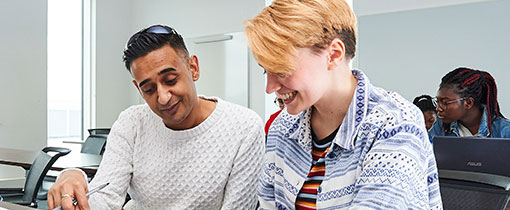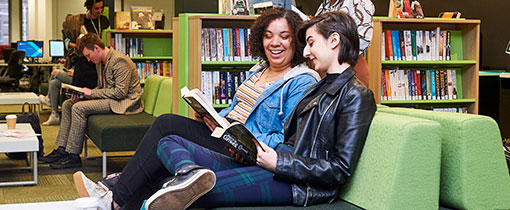
Introduction from Professor Julia Clarke
The Students and Education sub-strategy places student wellbeing as one of the foundations underpinning our Vision 2030, which aims:
- to transform the leadership and workforce of our Place through inclusive student success and world-class research
- to support our students in nurturing their physical, social and mental wellbeing
- to enable our students to take the greatest benefit from their higher education experience
- to make the greatest contribution they can to their communities,
Our strategy acknowledges that inclusivity, belonging and wellbeing reinforce each other. The strategy treats wellbeing as a form of social capital that is embodied and accumulated through an individual’s life journey. Wellbeing needs to be an integral element of how we study and work every day, and thus our strategy is based on seven pillars of Leadership, Transitions, Collaboration and Partnerships, Data and Research, Support and Prevention, Support and Intervention, and Staff.
The pandemic has had a direct effect on both the mental health and the wellbeing of many of our students, as they have struggled to maintain their studies in the face of significant challenges. It has also reinforced and widened gaps in access and privilege. We have, however, learned a great deal during this time, both as individuals and as a community, about our resilience and buoyancy; recognising that when we get together and commit to help each other in the face of unprecedented challenge, we can achieve great things.
So it is timely that students and staff have worked collaboratively to put in place an overarching strategy that covers all of the levels of support the University offers and how this support can be accessed, reflecting where we are and where we want to be by 2023. This strategy recognises the synergy between physical, social and mental wellbeing, and is underpinned by a desire for students to feel empowered individually and collectively, to achieve their full potential.
Key areas of our strategy
Angel Morphew – Student’s Union, VP Diversity officer
Stephanie Brady - Psychology School Representative
Oalere Bamigbade - Community and Welfare VP, Students’ Union
Olivia Simpson- Final year Medical Science and Clinical Practice student
We are delighted to contribute to the development and dissemination of this important University mental health and wellbeing strategy. We are pleased that it aligns well to the Student’s Union’s own Strategic Plan, which is informed by reflections of students’ feedback, and which has wellbeing as one of its core themes, alongside belonging, identity and community, opportunity, and student voice.
The development of this strategy has given us an opportunity to reflect with the University on where we are now and where we want to be by 2023, which offers a springboard of potential for continued and sustained collaboration. The strategy development is also timely, committing to exploring and meeting the needs of our students, within a compassionate, aware and inclusive community.
Mental health and wellbeing is important to students at the University of Wolverhampton, before drawing together the plans for our own future as a Union, we wanted to hear directly from our students. We wanted to truly understand our student communities by having clear, open conversations with students about their student experience, particularly reflecting on what it had been like be a student living through the Covid-19 pandemic – as well as their hopes for a brighter future.
In our extensive quantitative and qualitative survey of student engagement we asked students the extent to which Covid-19 has impacted their lives. Our students reported negative impacts across a wide range of issues including their social lives, mental health and wellbeing, and finances, as well as the teaching on their course and their own ability to do well at university. The stories we heard during the research, as well as from the students seeking support through our advice centre over the past 12 months, have shown that some of our students are facing incredible hardship.
From these conversations, we had a clear understanding of what students at Wolverhampton want from their time at university. Our own strategic plan was formed to help the entire student community bounce back from the pandemic and thrive, and we are pleased that these insights are infused in to the thinking of this strategy.
We want our students to feel happy and well, and to be supported to talk about their mental health without stigma and within safe spaces that hears their experiences. We want our students to feel empowered to take care of their own wellbeing, and know exactly where to go in order to seek help and receive timely and appropriate support on every occasion. We are committed to working with our students and partner organisations to develop and deliver projects/initiatives that improve well-being.
As a Student’s Union, we will ensure that student mental health and wellbeing always stays at the top of the agenda. We will be a union that provides its members with incredible opportunities to learn, grow, indulge passions and make life-changing connections. Finally, as a campaigning organisation, we will be resolute in our determination to ensure the student voice is always heard, understood, and acted upon.
This strategy has had oversight and focused development from some key collaborators via a task and finish group, who will now form the basis of the strategy’s dissemination and action plan in the development of a student mental health and wellbeing group.
- Clare Dickens – Academic Lead – Mental Health and Wellbeing. College of Learning and Teaching, and Task and Finish Group Chair.
- Phil Adeogun - Mental Health and Wellbeing Team Manager, Student Support and Wellbeing
- Olaere Bamigbade- Community and Welfare VP, Students’ Union (SU)
- Stephanie Brady- Psychology School Representative, Students Union
- James Dale - Sport and Performance Development Manager, Faculty of Education Health and Wellbeing
- Ruth Fairclough- Head of Department of Mathematics, Three Minutes to Save a Life Co-Trainer and Faculty Enabling Tutor, Faculty of Science and Engineering
- Kimberly Forlini-Softley- Professional Services Staff Governor and Alumni and DB Manager, External Engagement
- Ruby Hart - Students and Education Programme Manager, College of Learning and Teaching
- Dr Jamie Annakin – Principal Public Health Specialist, City of Wolverhampton Council
- Angel Morphew - Students’ Union, VP Diversity officer
- Chinny Nzekwe-Excel- International Academic Lead, Business School, FABSS
- Ann Preece – Deputy Director of Mental Health, Black Country Partnerships NHS Trust
- Olivia Simpson- Final year Medical Science and Clinical Practice student
- Ilyan Stefanov - Head of Student Support and Wellbeing
- Debbie Stevens-Gill - Senior Lecturer in Psychology, Faculty of Education Health and Wellbeing
- Victoria Wall- Executive Officer
Our vision
At the University of Wolverhampton, we have weaved our commitment to develop People and Place into all we offer and all we stand for. We are therefore placing belonging, inclusivity, and wellbeing at the heart of our activities, which have an impact on our individual and collective ability to flourish, and grow our capabilities.
We know that mental health and wellbeing intersects across all aspects of a student’s experience, and as such we are taking a university-wide approach, committing to principles that see wellbeing as everyone’s concern.
Behind every student is a human being, each with their own story. Within our vision we are committed to working together in order to not leave anyone behind, valuing the individual, their success, and their journey, to include where they come from and where they want to be. We want every student to feel empowered to aim high and look beyond any pre-determined limits to their success.
Our aims:
- To achieve a step change in student mental health and wellbeing, with strong leadership committed to prioritising and advancing this agenda within the planning and dissemination of all its activities.
- To measure and make use of our data in order to evaluate and improve what we offer, and explore innovative and inclusive methodological approaches to gaining student insights of their living experience in order to remove barriers to partnership and participation.
- To create a university environment and student journey which is conducive to mental health and wellbeing, and actively seeks to mitigate the contextual risk factors our environment can harbour at their source.
- To continue to build on and strengthen established collaborative links that we have with our community members, including external agencies such as Public Health, the NHS, and the voluntary sector, in order to enhance the support and opportunities available to students.
- To take a course- and programme-based approach in order to infuse mental health and wellbeing principles in to our curriculum by design.
- To support students to disclose any difficulties they are experiencing, in order to offer timely, proportionate and individualised support.
- To reflect and recognise the synergy between staff wellbeing and that of students, to provide training and support for staff in relation to mental health and wellbeing.
In order to offer a framing for how mental health and wellbeing is viewed within our context, this strategy emerges from recognition that mental health and wellbeing is not merely the absence of ill health. Many students live with the presence of both physical and mental health issues, yet lead lives that are fulfilling and have gained a foundation with strategies that support them to live healthily and to flourish.
This strategy therefore does not only look to focus on intervention and response, instead covering a continuum that spans prevention and enhancement for all, right through to timely and personalised intervention and support for those who need it. When we view the support needs of our students, the strategy has us zoom in to consider what we can and should offer, but then zoom out and look to connect the multiple resources offered within our communities to make them aware of our student population’s needs through collaboration and continued working partnerships.
The lens, through which we have developed this strategy, reflects a much more critical exploration of the origins of poor mental health and wellbeing. There is of course a well-established debate about the role of the medical model in human wellbeing, it is one we need to consider and not dismiss in favour of any other.
Moreover we need to aim to achieve synergy, multiple ways of viewing mental health and wellbeing, where we embrace and view the emotional distress of a student also as a possible personal rational response to trauma and structural injustices in their university and social contexts.
Our work aims to promote and enhance a compassionate and aware community whose members can recognise distress in both themselves and others, with a commitment to alleviating it. These goals are underpinned by an enhanced ability to practice and promote self-awareness and self-care.
The strategy will not however view any one person as the sole source of problems to be fixed. It will focus equal attention on the structural barriers and systemic stressors that higher education can create, and in turn need to be improved on an ongoing basis through a commitment to consider and mitigate them at their source.
On a wider scale, the extent of the mental health crisis in UK universities is reported in a study by the Institute for Public Policy Research (IPPR) think-tank, (Thorley, 2017). It shows that, over a decade, the number of students who disclosed a mental health problem in their first year rose fivefold to reach 15,395.
We might question the narrative of crisis if it is derived from increased disclosure from students. Campaigns such as ‘Time to Change’ are intended to reduce the stigma associated with mental health and wellbeing issues, and to call for social action to talk and break the silence.
There have been calls also from the Equality Challenge Unit and University Mental Health Advisors’ Network in recent years, for students to disclose their difficulties. Reflecting on the trend of increased disclosures, there may be no crisis at all, but rather an indication of success in campaigns promoting disclosure.
The ‘crisis’ perhaps derives from how well equipped HE settings are to actually respond to the needs these disclosures demand, and the extent to which this increasing demand has exposed some of the defects of the models currently used.
'Step Change' is a campaign from a Universities UK (UUK) national working group chaired by Professor Steve West. It includes a call for action, highlighting the duty of care universities have to their students (UUK, 2017) . Within this model, there is a push to adopt a whole-population approach to student mental health and wellbeing, asking universities to reconfigure themselves as health-promoting and supportive environments.
Therefore our strategy is underpinned with the absolute belief that everyone has a role to play in developing a wellbeing-conscious university, and in creating an environment whereby every student has the opportunity to flourish, and grow their capabilities. In summary, it is everyone’s business.
The Student Minds Mental Health Charter also promotes lenses through which universities should strategize their aims and activities surrounding mental health and wellbeing. It is an augmentation of these principles that will offer the pillars of our own mental health and wellbeing strategy, and focused reflection of what we already do and where we want to be.
Our strategy will follow the foundations of our Students and Education sub-strategy to be student-centred, programme-led and practice-based, with four key strands of focus:
- Inclusivity
- Wellbeing
- Partnership
- Community
This strategy sets out seven pillars: Leadership, Transitions, Collaboration and Partnerships, Data and Research, Support and Prevention, Support and Intervention, and, Staff. These offer us an opportunity to focus our reflections on where we are now, what we offer and what we stand for as a university, highlighting some of the specific contributions made by various parties involved in supporting student mental health and wellbeing. It will then reflect where we want to be by 2023 in order to improve and enhance what we do and what we offer.
Rather than focusing on singular interventions or services, this joined-up strategic approach weaves the student mental health and wellbeing agenda across all University policies, curricula and practice, permeating all aspects of its activity. To do so involves collaboration and coordination between all departments within the university, to include our partners the Student’s Union as well as external partners such as the NHS, Public Health, and voluntary organisations.
Any mental health and wellbeing difficulty, whatever its name or construct, relates to how someone feels, thinks and acts, and how they then connect and interact with their sense of self, and indeed others. Woven into these apparently simple questions are layers of complexity, choice in how one perceives the origins of these changes, and the fact that actions can often serve as communications (Dickens, 2020).
Origins, stories, experiences, and meaning-making are all richly diverse and unique to that individual and their own cultural context. In recognising this, we need to understand and continually commit to get to know who our students are, and what drives both their needs and their capabilities. We commit to ensure our environment, curriculum and opportunities; values and embraces them. All underpinned with the stark point that students do not want to stand out as different, but do want to be recognised as individuals (Hockings, 2010).
With this said, we do have some understanding about gaps, groupings of students through shared threads of their identity and background, and who are possibly being left behind, or who are possibly not coming forward when they are struggling. If these gaps remain, they pose a threat to retention and progression, which as a university are two of our most pressing concerns.
Each student who doesn’t progress in their studies, represents someone who has possibly not achieved what they set out to do, and have possibly not been able to fulfil the realisation of their ambitions. Every one of them should be reflected back to our university leadership as a red flag. Therefore the University’s Access and Participation Plan (2020/25) aims to eradicate award and non-continuation gaps between students with protected and non-protected characteristic groups by 2030.
We also know that a significant drive for an HE-based wellbeing strategy has emerged from a reported increase in the amount of HE students dying by suicide. Within this strategy proposal, a specific suicide prevention and postvention policy will be finalised, aided by the formation of a new Suicide Prevention and Response Group.
We embrace a principle that student suicide rates alone are not a good measure of a HEI’s provision of mental health and wellbeing support. However, there is overlap between suicide prevention and good practice for mental health and wellbeing.
Our student community very much mirrors the diverse communities in the Black Country. At the point of this strategy being published, 54% of students are Black, Asian and Minority Ethnic, 67% are from the most disadvantaged backgrounds, and 50% of our undergraduate students are over 21 at the age of entry, and 15% of our students have formally disclosed a Disability.
Beyond these apparently simplistic groupings, is the need to consider the intersectional identities that students navigate, which can see them trying to navigate thresholds that simply will not flex. Each of our students will be viewed through a strength-based lens, resilient and capable in their own right, but possibly less so within a HE environment in which they are othered because it has not been designed for their needs, and expects assimilation to dominant ways of engaging in learning and accessing support.
Moreover, our environment should foster a culture whereby each of our students has the space to flourish and grow, as well as to develop and build on their capabilities.


/prod01/wlvacuk/media/departments/digital-content-and-communications/images-2024/240328-Varsity-Line-Up-Resized.jpg)
/prod01/wlvacuk/media/departments/digital-content-and-communications/images-18-19/220325-Engineers_teach_thumbail.jpg)
/prod01/wlvacuk/media/departments/digital-content-and-communications/images-2024/240515-Spencer-Jones-Award-Resized.jpg)
/prod01/wlvacuk/media/departments/digital-content-and-communications/images-2024/240320-Uzbekistan-Resized.jpg)
/prod01/wlvacuk/media/departments/digital-content-and-communications/images-2024/240229-The-Link-Resized.jpg)
/prod01/wlvacuk/media/departments/digital-content-and-communications/images-2024/240516-Andy-Gibson-Resized.jpg)






/prod01/wlvacuk/media/departments/digital-content-and-communications/images-18-19/50566188731_14bc1ccc68_c-(2).jpg)
/prod01/wlvacuk/media/departments/digital-content-and-communications/images-18-19/34495109404_66d45d0cb6_c-(1).jpg)
/prod01/wlvacuk/media/departments/digital-content-and-communications/images-18-19/Su-Awards-2019(1).jpg)
/prod01/wlvacuk/media/departments/digital-content-and-communications/images-18-19/ceLT7Mkj_400x400.jpg)
/prod01/wlvacuk/media/departments/digital-content-and-communications/images-18-19/umhd_together__illustrations_bylucy.jpg)